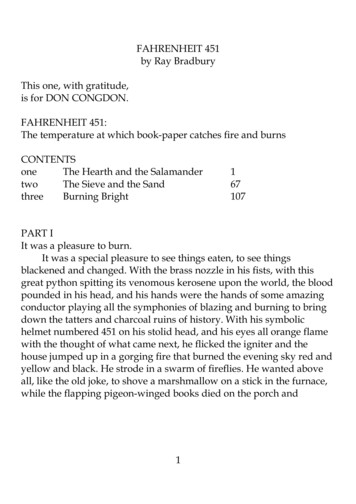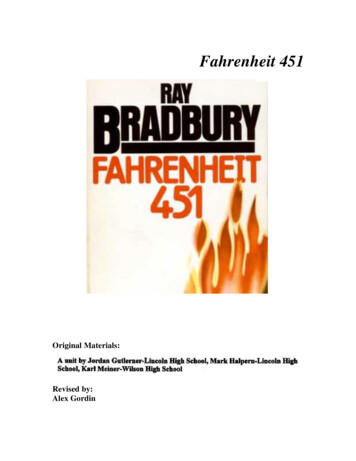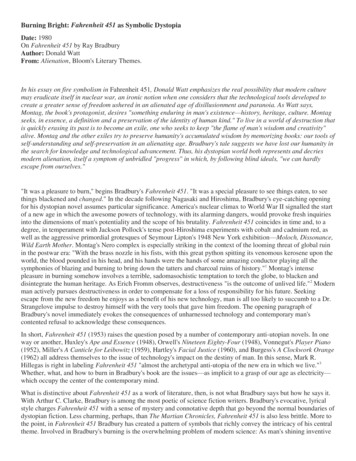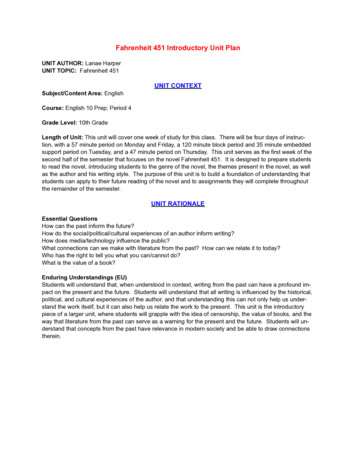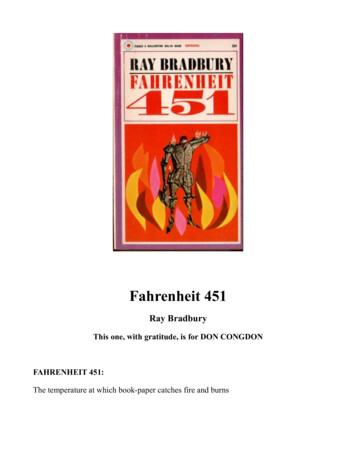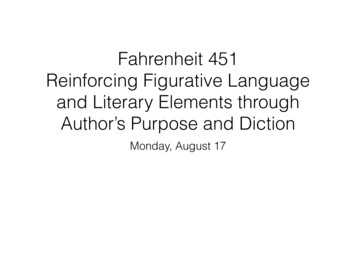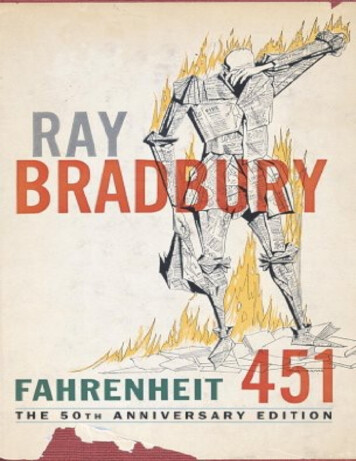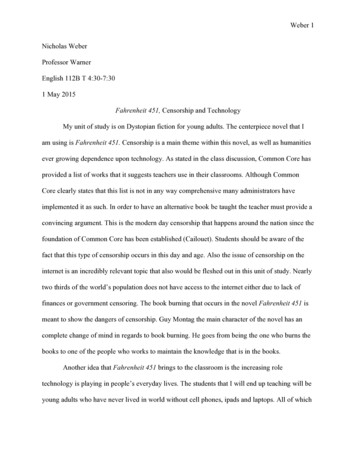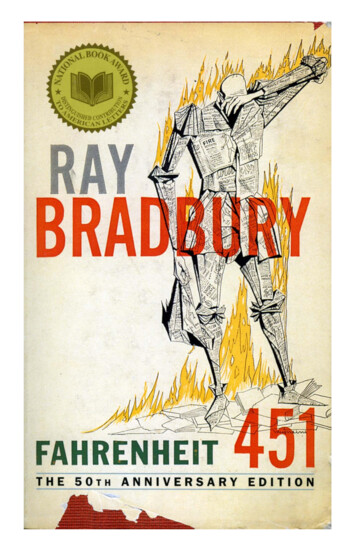
Transcription
FAHRENHEIT 451Ray BradburyThis one, with gratitude, is for DON CONGDON.FAHRENHEIT 451:The temperature at which book-paper catches fireand burns.
PART IIT WAS A PLEASURE TO BURNIT was a special pleasure to see things eaten, to see thingsblackened and changed. With the brass nozzle in his fists,with this great python spitting its venomous kerosene uponthe world, the blood pounded in his head, and his handswere the hands of some amazing conductor playing all thesymphonies of blazing and burning to bring down thetatters and charcoal ruins of history. With his symbolichelmet numbered 451 on his stolid head, and his eyes allorange flame with the thought of what came next, heflicked the igniter and the house jumped up in a gorgingfire that burned the evening sky red and yellow and black.He strode in a swarm of fireflies. He wanted above all, likethe old joke, to shove a marshmallow on a stick in thefurnace, while the flapping pigeon-winged books died onthe porch and lawn of the house. While the books went upin sparkling whirls and blew away on a wind turned darkwith burning.Montag grinned the fierce grin of all men singed anddriven back by flame.He knew that when he returned to the firehouse, he mightwink at himself, a minstrel man, burnt-corked, in themirror. Later, going to sleep, he would feel the fiery smilestill gripped by his face muscles, in the dark. It never wentaway, that. smile, it never ever went away, as long as heremembered.He hung up his black-beetle-coloured helmet and shinedit, he hung his flameproof jacket neatly; he showeredPage 3
luxuriously, and then, whistling, hands in pockets, walkedacross the upper floor of the fire station and fell down thehole. At the last moment, when disaster seemed positive, hepulled his hands from his pockets and broke his fall bygrasping the golden pole. He slid to a squeaking halt, theheels one inch from the concrete floor downstairs.He walked out of the fire station and along the midnightstreet toward the subway where the silent, air-propelledtrain slid soundlessly down its lubricated flue in the earthand let him out with a great puff of warm air an to thecream-tiled escalator rising to the suburb.Whistling, he let the escalator waft him into the still nightair. He walked toward the comer, thinking little at allabout nothing in particular. Before he reached the corner,however, he slowed as if a wind had sprung up fromnowhere, as if someone had called his name.The last few nights he had had the most uncertain feelingsabout the sidewalk just around the corner here, moving inthe starlight toward his house. He had felt that a momentbefore his making the turn, someone had been there. Theair seemed charged with a special calm as if someone hadwaited there, quietly, and only a moment before he came,simply turned to a shadow and let him through. Perhapshis nose detected a faint perfume, perhaps the skin on thebacks of his hands, on his face, felt the temperature rise atthis one spot where a person's standing might raise theimmediate atmosphere ten degrees for an instant. Therewas no understanding it. Each time he made the turn, hesaw only the white, unused, buckling sidewalk, withperhaps, on one night, something vanishing swiftly acrossa lawn before he could focus his eyes or speak.Page 4
But now, tonight, he slowed almost to a stop. His innermind, reaching out to turn the corner for him, had heardthe faintest whisper. Breathing? Or was the atmospherecompressed merely by someone standing very quietly there,waiting?He turned the corner.The autumn leaves blew over the moonlit pavement in sucha way as to make the girl who was moving there seem fixedto a sliding walk, letting the motion of the wind and theleaves carry her forward. Her head was half bent to watchher shoes stir the circling leaves. Her face was slender andmilk-white, and in it was a kind of gentle hunger thattouched over everything with tireless curiosity. It was alook, almost, of pale surprise; the dark eyes were so fixed tothe world that no move escaped them. Her dress was whiteand it whispered. He almost thought he heard the motionof her hands as she walked, and the infinitely small soundnow, the white stir of her face turning when she discoveredshe was a moment away from a man who stood in themiddle of the pavement waiting.The trees overhead made a great sound of letting downtheir dry rain. The girl stopped and looked as if she mightpull back in surprise, but instead stood regarding Montagwith eyes so dark and shining and alive, that he felt hehad said something quite wonderful. But he knew hismouth had only moved to say hello, and then when sheseemed hypnotized by the salamander on his arm and thephoenix-disc on his chest, he spoke again."Of course," he said, "you're a new neighbour, aren't you?""And you must be"-she raised her eyes from hisprofessional symbols-"the fireman." Her voice trailed off.Page 5
"How oddly you say that.""I'd-I'd have known it with my eyes shut," she said, slowly."What-the smell of kerosene? My wife always complains,"he laughed. "You never wash it off completely.""No, you don't," she said, in awe.He felt she was walking in a circle about him, turning himend for end, shaking him quietly, and emptying hispockets, without once moving herself."Kerosene," he said, because the silence had lengthened, "isnothing but perfume to me.""Does it seem like that, really?""Of course. Why not?"She gave herself time to think of it. "I don't know." Sheturned to face the sidewalk going toward their homes. "Doyou mind if I walk back with you? I'm ClarisseMcClellan.""Clarisse. Guy Montag. Come along. What are you doingout so late wandering around? How old are you?"They walked in the warm-cool blowing night on thesilvered pavement and there was the faintest breath offresh apricots and strawberries in the air, and he lookedaround and realized this was quite impossible, so late inthe year.There was only the girl walking with him now, her facebright as snow in the moonlight, and he knew she wasworking his questions around, seeking the best answers shecould possibly give."Well," she said, "I'm seventeen and I'm crazy. My unclesays the two always go together. When people ask your age,he said, always say seventeen and insane. Isn't this a nicetime of night to walk? I like to smell things and look atPage 6
things, and sometimes stay up all night, walking, andwatch the sun rise."They walked on again in silence and finally she said,thoughtfully, "You know, I'm not afraid of you at all."He was surprised. "Why should you be?""So many people are. Afraid of firemen, I mean. Butyou're just a man, after all."He saw himself in her eyes, suspended in two shiningdrops of bright water, himself dark and tiny, in fine detail,the lines about his mouth, everything there, as if her eyeswere two miraculous bits of violet amber that mightcapture and hold him intact. Her face, turned to him now,was fragile milk crystal with a soft and constant light init. It was not the hysterical light of electricity but-what?But the strangely comfortable and rare and gentlyflattering light of the candle. One time, when he was achild, in a power-failure, his mother had found and lit alast candle and there had been a brief hour of rediscovery,of such illumination that space lost its vast dimensionsand drew comfortably around them, and they, mother andson, alone, transformed, hoping that the power might notcome on again too soon .And then Clarisse McClellan said:"Do you mind if I ask? How long have you worked at beinga fireman?""Since I was twenty, ten years ago.""Do you ever read any of the books you bum?"He laughed. "That's against the law!""Oh. Of course."Page 7
"It's fine work. Monday bum Millay, WednesdayWhitman, Friday Faulkner, burn 'em to ashes, then burnthe ashes. That's our official slogan."They walked still further and the girl said, "Is it true thatlong ago firemen put fires out instead of going to startthem?""No. Houses. have always been fireproof, take my word forit.""Strange. I heard once that a long time ago houses used toburn by accident and they needed firemen to stop theflames."He laughed.She glanced quickly over. "Why are you laughing?""I don't know." He started to laugh again and stopped"Why?""You laugh when I haven't been funny and you answerright off. You never stop to think what I've asked you."He stopped walking, "You are an odd one," he said,looking at her. "Haven't you any respect?""I don't mean to be insulting. It's just, I love to watchpeople too much, I guess.""Well, doesn't this mean anything to you?" He tapped thenumerals 451 stitched on his char-coloured sleeve."Yes," she whispered. She increased her pace. "Have youever watched the jet cars racing on the boulevards downthat way?"You're changing the subject!""I sometimes think drivers don't know what grass is, orflowers, because they never see them slowly," she said. "Ifyou showed a driver a green blur, Oh yes! he'd say, that'sgrass! A pink blur? That's a rose-garden! White blurs arePage 8
houses. Brown blurs are cows. My uncle drove slowly on ahighway once. He drove forty miles an hour and theyjailed him for two days. Isn't that funny, and sad, too?""You think too many things," said Montag, uneasily."I rarely watch the 'parlour walls' or go to races or FunParks. So I've lots of time for crazy thoughts, I guess. Haveyou seen the two-hundred-foot-long billboards in thecountry beyond town? Did you know that once billboardswere only twenty feet long? But cars started rushing by soquickly they had to stretch the advertising out so it wouldlast.""I didn't know that!" Montag laughed abruptly."Bet I know something else you don't. There's dew on thegrass in the morning."He suddenly couldn't remember if he had known this ornot, and it made him quite irritable."And if you look"-she nodded at the sky-"there's a man inthe moon."He hadn't looked for a long time.They walked the rest of the way in silence, hersthoughtful, his a kind of clenching and uncomfortablesilence in which he shot her accusing glances. When theyreached her house all its lights were blazing."What's going on?" Montag had rarely seen that manyhouse lights."Oh, just my mother and father and uncle sitting around,talking. It's like being a pedestrian, only rarer. My unclewas arrested another time-did I tell you?-for being apedestrian. Oh, we're most peculiar.""But what do you talk about?"Page 9
She laughed at this. "Good night!" She started up her walk.Then she seemed to remember something and came back tolook at him with wonder and curiosity. "Are you happy?"she said."Am I what?" he cried.But she was gone-running in the moonlight. Her frontdoor shut gently."Happy! Of all the nonsense."He stopped laughing.He put his hand into the glove-hole of his front door andlet it know his touch. The front door slid open.Of course I'm happy. What does she think? I'm not? heasked the quiet rooms. He stood looking up at theventilator grille in the hall and suddenly remembered thatsomething lay hidden behind the grille, something thatseemed to peer down at him now. He moved his eyesquickly away.What a strange meeting on a strange night. Heremembered nothing like it save one afternoon a year agowhen he had met an old man in the park and they hadtalked .Montag shook his head. He looked at a blank wall. Thegirl's face was there, really quite beautiful in memory:astonishing, in fact. She had a very thin face like the dialof a small clock seen faintly in a dark room in the middleof a night when you waken to see the time and see theclock telling you the hour and the minute and the second,with a white silence and a glowing, all certainty andknowing what it has to tell of the night passing swiftly ontoward further darknesses but moving also toward a newsun.Page 10
"What?" asked Montag of that other self, the subconsciousidiot that ran babbling at times, quite independent of will,habit, and conscience.He glanced back at the wall. How like a mirror, too, herface. Impossible; for how many people did you know thatrefracted your own light to you? People were more often-hesearched for a simile, found one in his work-torches,blazing away until they whiffed out. How rarely did otherpeople's faces take of you and throw back to you your ownexpression, your own innermost trembling thought?What incredible power of identification the girl had; shewas like the eager watcher of a marionette show,anticipating each flicker of an eyelid, each gesture of hishand, each flick of a finger, the moment before it began.How long had they walked together? Three minutes? Five?Yet how large that time seemed now. How immense afigure she was on the stage before him; what a shadow shethrew on the wall with her slender body! He felt that if hiseye itched, she might blink. And if the muscles of his jawsstretched imperceptibly, she would yawn long before hewould.Why, he thought, now that I think of it, she almost seemedto be waiting for me there, in the street, so damned late atnight . .He opened the bedroom door.It was like coming into the cold marbled room of amausoleum after the moon had set. Complete darkness, nota hint of the silver world outside, the windows tightlyshut, the chamber a tomb-world where no sound from thegreat city could penetrate. The room was not empty.He listened.Page 11
The little mosquito-delicate dancing hum in the air, theelectrical murmur of a hidden wasp snug in its specialpink warm nest. The music was almost loud enough so hecould follow the tune.He felt his smile slide away, melt, fold over, and down onitself like a tallow skin, like the stuff of a fantastic candleburning too long and now collapsing and now blown out.Darkness. He was not happy. He was not happy. He saidthe words to himself. He recognized this as the true state ofaffairs. He wore his happiness like a mask and the girlhad run off across the lawn with the mask and there wasno way of going to knock on her door and ask for it back.Without turning on the light he imagined how this roomwould look. His wife stretched on the bed, uncovered andcold, like a body displayed on the lid of a tomb, her eyesfixed to the ceiling by invisible threads of steel,immovable. And in her ears the little Seashells, thethimble radios tamped tight, and an electronic ocean ofsound, of music and talk and music and talk coming in,coming in on the shore of her unsleeping mind. The roomwas indeed empty. Every night the waves came in and boreher off on their great tides of sound, floating her, wideeyed, toward morning. There had been no night in the lasttwo years that Mildred had not swum that sea, had notgladly gone down in it for the third time.The room was cold but nonetheless he felt he could notbreathe. He did not wish to open the curtains and open thefrench windows, for he did not want the moon to come intothe room. So, with the feeling of a man who will die in thenext hour for lack of air,.he felt his way toward his open,separate, and therefore cold bed.Page 12
An instant before his foot hit the object on the floor heknew he would hit such an object. It was not unlike thefeeling he had experienced before turning the corner andalmost knocking the girl down. His foot, sendingvibrations ahead, received back echoes of the small barrieracross its path even as the foot swung. His foot kicked. Theobject gave a dull clink and slid off in darkness.He stood very straight and listened to the person on thedark bed in the completely featureless night. The breathcoming out of the nostrils was so faint it stirred only thefurthest fringes of life, a small leaf, a black feather, asingle fibre of hair.He still did not want outside light. He pulled out hisigniter, felt the salamander etched on its silver disc, gave ita flick.Two moonstones looked up at him in the light of his smallhand-held fire; two pale moonstones buried in a creek ofclear water over which the life of the world ran, nottouching them."Mildred ! "Her face was like a snow-covered island upon which rainmight fall; but it felt no rain; over which clouds mightpass their moving shadows, but she felt no shadow. Therewas only the singing of the thimble-wasps in her tampedshut ears, and her eyes all glass, and breath going in andout, softly, faintly, in and out of her nostrils, and her notcaring whether it came or went, went or came.The object he had sent tumbling with his foot now glintedunder the edge of his own bed. The small crystal bottle ofsleeping-tablets which earlier today had been filled withPage 13
thirty capsules and which now lay uncapped and empty inthe light of the tiny flare.As he stood there the sky over the house screamed. Therewas a tremendous ripping sound as if two giant hands hadtorn ten thousand miles of black linen down the seam.Montag was cut in half. He felt his chest chopped downand split apart. The jet-bombs going over, going over, goingover, one two, one two, one two, six of them, nine of them,twelve of them, one and one and one and another andanother and another, did all the screaming for him. Heopened his own mouth and let their shriek come down andout between his bared teeth. The house shook. The flarewent out in his hand. The moonstones vanished. He felthis hand plunge toward the telephone.The jets were gone. He felt his lips move, brushing themouthpiece of the phone. "Emergency hospital." A terriblewhisper.He felt that the stars had been pulverized by the sound ofthe black jets and that in the morning the earth would bethought as he stood shivering in the dark, and let his lipsgo on moving and moving.They had this machine. They had two machines, really.One of them slid down into your stomach like a blackcobra down an echoing well looking for all the old waterand the old time gathered there. It drank up the greenmatter that flowed to the top in a slow boil. Did it drink ofthe darkness? Did it suck out all the poisons accumulatedwith the years? It fed in silence with an occasional soundof inner suffocation and blind searching. It had an Eye.The impersonal operator of the machine could, by wearinga special optical helmet, gaze into the soul of the personPage 14
whom he was pumping out. What did the Eye see? He didnot say. He saw but did not see what the Eye saw. Theentire operation was not unlike the digging of a trench inone's yard. The woman on the bed was no more than a hardstratum of marble they had reached. Go on, anyway, shovethe bore down, slush up the emptiness, if such a thingcould be brought out in the throb of the suction snake. Theoperator stood smoking a cigarette. The other machine wasworking too.The other machine was operated by an equally impersonalfellow in non-stainable reddish-brown overalls. Thismachine pumped all of the blood from the body andreplaced it with fresh blood and serum."Got to clean 'em out both ways," said the operator,standing over the silent woman. "No use getting thestomach if you don't clean the blood. Leave that stuff inthe blood and the blood hits the brain like a mallet, bang,a couple of thousand times and the brain just gives up, justquits.""Stop it!" said Montag."I was just sayin'," said the operator."Are you done?" said Montag.They shut the machines up tight. "We're done." His angerdid not even touch them. They stood with the cigarettesmoke curling around their noses and into their eyeswithout making them blink or squint. "That's fifty bucks.""First, why don't you tell me if she'll be all right?""Sure, she'll be O.K. We got all the mean stuff right in oursuitcase here, it can't get at her now. As I said, you takeout the old and put in the new and you're O.K."Page 15
"Neither of you is an M.D. Why didn't they send an M.D.from Emergency?""Hell! " the operator's cigarette moved on his lips. "We getthese cases nine or ten a night. Got so many, starting a fewyears ago, we had the special machines built. With theoptical lens, of course, that was new; the rest is ancient.You don't need an M.D., case like this; all you need is twohandymen, clean up the problem in half an hour. Look"he started for the door-"we gotta go. Just had another callon the old ear-thimble. Ten blocks from here. Someone elsejust jumped off the cap of a pillbox. Call if you need usagain. Keep her quiet. We got a contra-sedative in her.She'll wake up hungry. So long."And the men with the cigarettes in their straight-linedmouths, the men with the eyes of puff-adders, took uptheir load of machine and tube, their case of liquidmelancholy and the slow dark sludge of nameless stuff,and strolled out the door.Montag sank down into a chair and looked at this woman.Her eyes were closed now, gently, and he put out his handto feel the warmness of breath on his palm."Mildred," he said, at last.There are too many of us, he thought. There are billions ofus and that's too many. Nobody knows anyone. Strangerscome and violate you. Strangers come and cut your heartout. Strangers come and take your blood. Good God, whowere those men? I never saw them before in my life!Half an hour passed.The bloodstream in this woman was new and it seemed tohave done a new thing to her. Her cheeks were very pinkand her lips were very fresh and full of colour and theyPage 16
looked soft and relaxed. Someone else's blood there. If onlysomeone else's flesh and brain and memory. If only theycould have taken her mind along to the dry-cleaner's andemptied the pockets and steamed and cleansed it andreblocked it and brought it back in the morning. If only . .He got up and put back the curtains and opened thewindows wide to let the night air in. It was two o'clock inthe morning. Was it only an hour ago, Clarisse McClellanin the street, and him coming in, and the dark room andhis foot kicking the little crystal bottle? Only an hour, butthe world had melted down and sprung up in a new andcolourless form.Laughter blew across the moon-coloured lawn from thehouse of Clarisse and her father and mother and the unclewho smiled so quietly and so earnestly. Above all, theirlaughter was relaxed and hearty and not forced in anyway, coming from the house that was so brightly lit thislate at night while all the other houses were kept tothemselves in darkness. Montag heard the voices talking,talking, talking, giving, talking, weaving, reweaving theirhypnotic web.Montag moved out through the french windows andcrossed the lawn, without even thinking of it. He stoodoutside the talking house in the shadows, thinking hemight even tap on their door and whisper, "Let me comein. I won't say anything. I just want to listen. What is ityou're saying?"But instead he stood there, very cold, his face a mask ofice, listening to a man's voice (the uncle?) moving along atan easy pace:Page 17
"Well, after all, this is the age of the disposable tissue.Blow your nose on a person, wad them, flush them away,reach for another, blow, wad, flush. Everyone usingeveryone else's coattails. How are you supposed to root forthe home team when you don't even have a programme orknow the names? For that matter, what colour jerseys arethey wearing as they trot out on to the field?"Montag moved back to his own house, left the windowwide, checked Mildred, tucked the covers about hercarefully, and then lay down with the moonlight on hischeek-bones and on the frowning ridges in his brow, withthe moonlight distilled in each eye to form a silver cataractthere.One drop of rain. Clarisse. Another drop. Mildred. A third.The uncle. A fourth. The fire tonight. One, Clarisse. Two,Mildred. Three, uncle. Four, fire, One, Mildred, two,Clarisse. One, two, three, four, five, Clarisse, Mildred,uncle, fire, sleeping-tablets, men, disposable tissue, coattails, blow, wad, flush, Clarisse, Mildred, uncle, fire,tablets, tissues, blow, wad, flush. One, two, three, one, two,three! Rain. The storm. The uncle laughing. Thunderfalling downstairs. The whole world pouring down. Thefire gushing up in a volcano. All rushing on down aroundin a spouting roar and rivering stream toward morning."I don't know anything any more," he said, and let a sleeplozenge dissolve on his tongue.At nine in the morning, Mildred's bed was empty.Montag got up quickly, his heart pumping, and ran downthe hall and stopped at the kitchen door.Toast popped out of the silver toaster, was seized by aspidery metal hand that drenched it with melted butter.Page 18
Mildred watched the toast delivered to her plate. She hadboth ears plugged with electronic bees that were hummingthe hour away. She looked up suddenly, saw him, andnodded."You all right?" he asked.She was an expert at lip-reading from ten years ofapprenticeship at Seashell ear-thimbles. She nodded again.She set the toaster clicking away at another piece of bread.Montag sat down.His wife said, "I don't know why I should be so hungry.""You-?""I'm HUNGRY.""Last night," he began."Didn't sleep well. Feel terrible," she said. "God, I'mhungry. I can't figure it.""Last night-" he said again.She watched his lips casually. "What about last night?""Don't you remember?""What? Did we have a wild party or something? Feel likeI've a hangover. God, I'm hungry. Who was here?""A few people," he said."That's what I thought." She chewed her toast. "Sorestomach, but I'm hungry as all-get-out. Hope I didn't doanything foolish at the party.""No," he said, quietly.The toaster spidered out a piece of buttered bread for him.He held it in his hand, feeling grateful."You don't look so hot yourself," said his wife.In the late afternoon it rained and the entire world wasdark grey. He stood in the hall of his house, putting on hisbadge with the orange salamander burning across it. HePage 19
stood looking up at the air-conditioning vent in the hallfor a long time. His wife in the TV parlour paused longenough from reading her script to glance up. "Hey," shesaid. "The man's THINKING!""Yes," he said. "I wanted to talk to you." He paused. "Youtook all the pills in your bottle last night.""Oh, I wouldn't do that," she said, surprised."The bottle was empty.""I wouldn't do a thing like that. Why would I do a thinglike that?" she asked."Maybe you took two pills and forgot and took two more,and forgot again and took two more, and were so dopy youkept right on until you had thirty or forty of them in you.""Heck," she said, "what would I want to go and do a sillything like that for?""I don't know," he said.She was quite obviously waiting for him to go. "I didn't dothat," she said. "Never in a billion years.""All right if you say so," he said."That's what the lady said." She turned back to her script."What's on this afternoon?" he asked tiredly.She didn't look up from her script again. "Well, this is aplay comes on the wall-to-wall circuit in ten minutes. Theymailed me my part this morning. I sent in some box-tops.They write the script with one part missing. It's a newidea. The home-maker, that's me, is the missing part.When it comes time for the missing lines, they all look atme out of the three walls and I say the lines: Here, forinstance, the man says, What do you think of this wholeidea, Helen?' And he looks at me sitting here centre stage,see? And I say, I say --" She paused and ran her fingerPage 20
under a line in the script. " I think that's fine!' And thenthey go on with the play until he says, Do you agree tothat, Helen!' and I say, I sure do!' Isn't that fun, Guy?"He stood in the hall looking at her."It's sure fun," she said."What's the play about?""I just told you. There are these people named Bob andRuth and Helen.""Oh.""It's really fun. It'll be even more fun when we can affordto have the fourth wall installed. How long you figurebefore we save up and get the fourth wall torn out and afourth wall-TV put in? It's only two thousand dollars.""That's one-third of my yearly pay.""It's only two thousand dollars," she replied. "And I shouldthink you'd consider me sometimes. If we had a fourthwall, why it'd be just like this room wasn't ours at all, butall kinds of exotic people's rooms. We could do without afew things.""We're already doing without a few things to pay for thethird wall. It was put in only two months ago, remember?""Is that all it was?" She sat looking at him for a longmoment. "Well, good-bye, dear." ."Good-bye," he said. He stopped and turned around. "Doesit have a happy ending?""I haven't read that far."He walked over, read the last page, nodded, folded thescript, and handed it back to her. He walked out of thehouse into the rain.The rain was thinning away and the girl was walking inthe centre of the sidewalk with her head up and the fewPage 21
drops falling on her face. She smiled when she sawMontag."Hello! "He said hello and then said, "What are you up to now?""I'm still crazy. The rain feels good. I love to walk in it."I don't think I'd like that," he said."You might if you tried.""I never have."She licked her lips. "Rain even tastes good.""What do you do, go around trying everything once?" heasked."Sometimes twice." She looked at something in her hand."What've you got there?" he said."I guess it's the last of the dandelions this year. I didn'tthink I'd find one on the lawn this late. Have you everheard of rubbing it under your chin? Look." She touchedher chin with the flower, laughing."Why?""If it rubs off, it means I'm in love. Has it?"He could hardly do anything else but look."Well?" she said."You're yellow under there.""Fine! Let's try YOU now.""It won't work for me.""Here." Before he could move she had put the dandelionunder his chin. He drew back and she laughed. "Holdstill!"She peered under his chin and frowned."Well?" he said."What a shame," she said. "You're not in love withanyone."Page 22
"Yes, I am ! ""It doesn't show.""I am very much in love!" He tried to conjure up a face tofit the words, but there was no face. "I am ! ""Oh please don't look that way.""It's that dandelion," he said. "You've used it all up onyourself. That's why it won't work for me.""Of course, that must be it. Oh, now I've upset you, I canse
FAHRENHEIT 451 Ray Bradbury This one, with gratitude, is for DON CONGDON. FAHRENHEIT 451: The temperature at which book-paper catches fire and burns. PART I . IT WAS A PLEASURE TO BURN . IT was a special pleasure to see things eaten, to see things blackened and changed. With the brass nozzle in his fists, with this great python spitting its venomous kerosene upon the world, the blood pounded .
